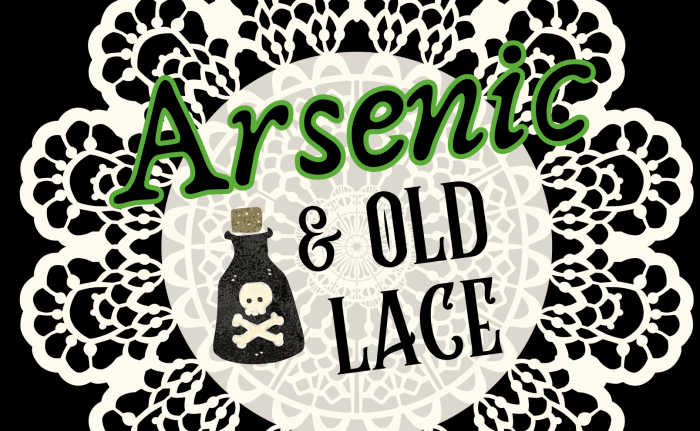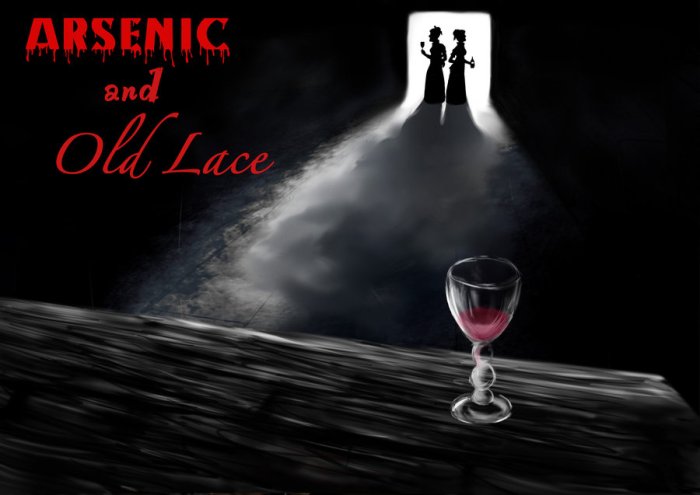Arsenic and old lace quotes – As we delve into the realm of “Arsenic and Old Lace” quotes, let’s embark on a captivating journey that unravels the profound significance and cultural impact of these timeless words. From the witty musings on insanity to the chilling insights into the nature of murder, these quotes have left an indelible mark on popular culture and continue to resonate with audiences today.
Join us as we explore the literary analysis, cultural impact, historical context, and theatrical interpretation of these unforgettable quotes, promising an enriching and thought-provoking exploration.
Literary Analysis of “Arsenic and Old Lace” Quotes

The play “Arsenic and Old Lace” by Joseph Kesselring is a dark comedy that explores the themes of insanity, morality, and the nature of good and evil. The play features a cast of eccentric characters, including the Brewster sisters, Abby and Martha, who are secretly poisoning lonely old men.
Significance of the Quote: “Insanity is relative. It depends on who has who locked in what cellar.”
This quote highlights the subjective nature of insanity. It suggests that what is considered insane by one person may not be considered insane by another. The quote also raises questions about the power dynamics between people and how they can be used to control or manipulate others.
Symbolism of the Quote: “There are two kinds of people in the world: those who bury bodies and those who don’t.”
This quote can be seen as a metaphor for the duality of human nature. It suggests that everyone has the potential for both good and evil. The quote also highlights the importance of choice and the consequences of our actions.
Characterization of Abby Brewster through her Quote: “I wish I could poison people by just glaring at them.”
This quote reveals Abby Brewster’s dark and twisted nature. It shows that she is not only capable of murder but also takes pleasure in it. The quote also highlights Abby’s lack of empathy and her inability to see the value of human life.
Cultural Impact of “Arsenic and Old Lace” Quotes: Arsenic And Old Lace Quotes

The play “Arsenic and Old Lace” has had a profound cultural impact, with its memorable quotes becoming ingrained in popular culture. One such quote, “Arsenic and old lace are two things that go together like love and marriage,” has been referenced in numerous films, television shows, and literary works.
This quote has become synonymous with the play’s dark humor and its exploration of the unexpected and often sinister nature of human relationships.
Influence on the Dark Comedy Genre
The success of “Arsenic and Old Lace” played a significant role in the development of the dark comedy genre. The play’s ability to blend humor and horror in a seamless manner inspired other playwrights and filmmakers to explore similar themes.
The play’s depiction of seemingly harmless elderly women who commit murder for seemingly altruistic reasons challenged traditional notions of morality and sparked discussions about the complexities of human behavior.
Relevance to Contemporary Society
The quote, “Murder is never a solution. It’s just the beginning of a whole lot of trouble,” remains relevant to contemporary society. Despite advancements in law enforcement and social welfare, murder continues to be a prevalent issue, with far-reaching consequences for individuals, families, and communities.
The quote serves as a cautionary tale, reminding us of the devastating impact of violence and the need for peaceful conflict resolution.
Historical Context of “Arsenic and Old Lace” Quotes

Set in the 1940s, “Arsenic and Old Lace” reflects the social and cultural norms of that era. The play’s themes of violence, mental illness, and euthanasia were influenced by the events of World War II and the changing attitudes towards aging and death.
Impact of World War II
The horrors of the war heightened the public’s awareness of violence and death. The play’s depiction of murder and mayhem reflects the heightened anxiety and fear prevalent during that time.
Furthermore, the war’s impact on mental health is evident in the character of Jonathan Brewster, a homicidal maniac who believes he is Teddy Roosevelt. The play suggests that the trauma of war can lead to mental instability.
Changing Attitudes towards Aging
The mid-20th century witnessed a shift in attitudes towards aging. The elderly were increasingly seen as a burden on society, leading to a rise in institutionalization and euthanasia.
Remember those witty one-liners from “Arsenic and Old Lace”? Well, if you’re looking to brush up on your trade jargon, check out the trade terms quiz module 1 . It’s like a verbal fencing match, but with acronyms and incoterms.
So, whether you’re preparing for a negotiation or just want to sound like a pro, give it a try. Afterward, you can always return to the hilarious quotes from “Arsenic and Old Lace” for a good laugh.
The play’s portrayal of the Brewster sisters, who euthanize lonely old men, reflects this changing view. It raises questions about the ethics of euthanasia and the societal responsibility towards the elderly.
Euthanasia and the Law
During the 1940s, euthanasia was illegal in the United States. However, the play’s depiction of it as a merciful act challenges the legal and moral boundaries of the time.
The play raises important questions about the right to die and the limits of compassion. It sparked debates about the need for legal reforms and a more nuanced understanding of euthanasia.
Theatrical Interpretation of “Arsenic and Old Lace” Quotes

The play’s dark humor and macabre themes lend themselves to a variety of theatrical interpretations. Quotes from the play can be delivered in ways that highlight their humor, suspense, or pathos.
Interpretations of the Quote, “I don’t mind dying, but I don’t want to be buried.”
This quote, uttered by the elderly Abby Brewster, can be interpreted in different ways depending on the actor’s delivery and the context of the scene. Some possible interpretations include:
- As a joke:Abby may deliver the line with a mischievous twinkle in her eye, suggesting that she is not afraid of death but rather finds the prospect of being buried amusing.
- As a statement of resignation:Abby may deliver the line with a sense of weariness, as if she is tired of life and simply wants to die peacefully.
- As a plea for help:Abby may deliver the line with a sense of desperation, as if she is afraid of being forgotten or abandoned after she dies.
Staging Techniques to Emphasize Humor and Macabre Nature, Arsenic and old lace quotes
The humor and macabre nature of the play’s quotes can be emphasized through various staging techniques, such as:
- Lighting:The use of dim lighting or shadows can create a sense of mystery and suspense, while bright lighting can highlight the absurdity of the characters’ actions.
- Sound effects:The use of sound effects, such as creaking doors or thunder, can create a sense of unease or foreboding.
- Movement:The use of exaggerated or stylized movement can highlight the characters’ eccentricities and the play’s macabre humor.
Timeline of Key Quotes and Their Contribution to Plot and Character Development
The following is a timeline of key quotes from the play and their contribution to the overall plot and character development:
- “I don’t mind dying, but I don’t want to be buried.”(Abby Brewster)
This quote introduces Abby’s quirky and macabre sense of humor, and it foreshadows the play’s themes of death and mortality.
- “We’re doing the Lord’s work, Mortimer.”(Abby Brewster)
This quote reveals the sisters’ twisted sense of morality, as they believe that they are doing good by poisoning lonely old men.
- “I think I’ll go out and buy some cyanide.”(Mortimer Brewster)
This quote highlights Mortimer’s growing disillusionment with his aunts and their sinister activities.
- “I’m not going to let you hurt my family.”(Mortimer Brewster)
This quote shows Mortimer’s determination to protect his family from the sisters’ evil.
- “I’m going to get away with this.”(Jonathan Brewster)
This quote reveals Jonathan’s delusions of grandeur and his belief that he can escape justice.
Key Questions Answered
What is the significance of the quote, “Insanity is relative. It depends on who has who locked in what cellar.”?
This quote highlights the subjective nature of insanity and the power dynamics that can influence our perceptions of others’ mental health.
How has the quote, “Arsenic and old lace are two things that go together like love and marriage” been used in popular culture?
This quote has been referenced in numerous films, television shows, and songs, often to evoke a sense of dark humor or macabre irony.
What does the quote, “Murder is never a solution. It’s just the beginning of a whole lot of trouble,” reveal about contemporary society?
This quote speaks to the far-reaching consequences of violence and the illusion that murder can provide a simple solution to complex problems.